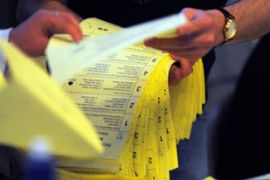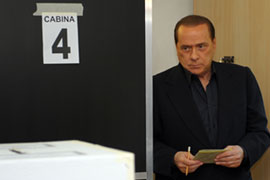Ruling parties set for EU poll hit
European parliament expected to move to the right as voters stay away from polls.

Ireland, Latvia and Malta all performed poorly in the polls to choose members of the assembly, which shapes laws which sets the budget and laws for the 27-nation bloc, the exit polls indicated.
But in Germany, the conservatives of Angela Merkel, the Chancellor, seemed likely to emerge as the largest party group, giving them a boost before elections due for later this year.
The Social Democrats, who sit in a “grand coalition” with Merkel and her allies were heading for the ir worst showing in an election since the second world war, projections suggested.
Facing defeat
Opinion polls before voting had already indicated that the governments of Britain, Spain, Hungary and Bulgaria were all facing defeat.
|
“It doesn’t look like the elections are going to be a triumph or a grand moment for European democracy” Thomas Klau, |
“It doesn’t look like the elections are going to be a triumph or a grand moment for European democracy,” Thomas Klau of the European Council on Foreign Relations said.
“National governments have set the perception that Europe is pretty useless by not being able to deliver a sufficiently strong and compelling and united message in the midst of the biggest economic crisis since the 1930s.”
Some voters have criticised the EU over the way it has handled the global financial crisis, despite it passing a fiscal stimulus plan in an attempt to revive the economy.
There is also widespread apathy towards a system that many people see as having little impact on their daily lives and others simply do not understand.
The European parliament shares power with the executive European Commission and a Council of EU heads of state and government.
“People are frustrated,” Daniel Gros, chairman of the European Movement, told Al Jazeera.
“They don’t have a clear choice between left and right. They just see economic difficulties mounting but don’t have a way to solve them.”
National issues
About 375 million people are eligible to vote across the EU, but many were believed to have voted in response to national issues and these have the greatest impact on the ruling parties.
 |
| Berlusconi’s party looked set to win in Italy despite a personal scandal [AFP] |
Greek voters, angry with scandals and the economic crisis, were set to hand the opposition Socialists victory over the ruling New Democracy party, an exit poll showed.
While in Ireland, the ruling Fianna Fail party could lose one of its four seats to a party that opposes the EU’s Lisbon reform treaty, intended to streamline decision making in the bloc.
Malta’s opposition Labour party claimed a majority in the contest for the Mediterranean island’s five parliamentary seats and the main Russian speakers’ party and other opposition groups made gains in Latvia, exit polls indicated.
Graham Watson, the leader of the centre-right Liberal Democrat grouping in the parliament, said early results suggested a rejection of the Socialist approach.
“People don’t want a return to socialism and that’s why the majority here will be a centre-right majority,” he said.
Right-wing gains
With most of the votes counted in Austria, the main right-wing party gained strongly while the Social Democrats, the main party in the governing coalition, lost substantial ground.
But the big winner in Austria was the Freedom party, which campaigned on an anti-Islam platform, doubling its strength over the 2004 elections to 13 per cent of the vote.
In Britain, poor results for the ruling Labour party seemed likely to renew calls for Gordon Brown, the prime minister, to step aside in favour of a new party leader.
Conservative governments in France and Italy, however, appeared likely to defeat their left-wing rivals.
“The right lost some voters in Germany but gained in Italy. In France it’s too early to tell. The far-right in some cases made spectacular gains, mainly in smaller marginal countries like Holland,” Gros said.
The UMP party of Nicolas Sarkozy, the French president, has steadily held the lead in polls, while the Freedom People’s Party of Silvio Berluconi, the Italian prime minister, had a two-digit lead over his main rival in the most recent polling despite a deep recession and a scandal over his private life.